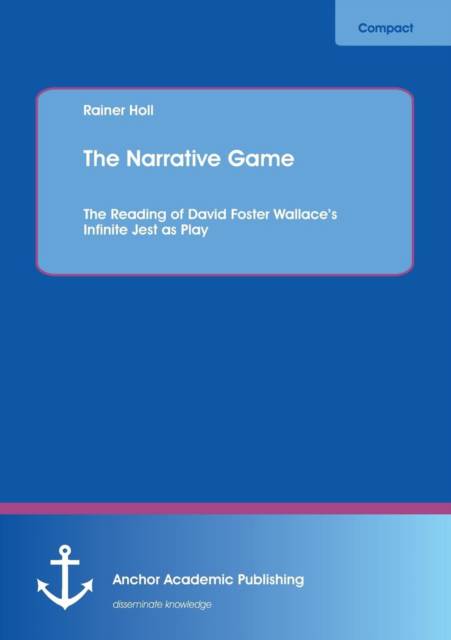
Door een staking bij bpost kan je online bestelling op dit moment iets langer onderweg zijn dan voorzien. Dringend iets nodig? Onze winkels ontvangen jou met open armen!
- Afhalen na 1 uur in een winkel met voorraad
- Gratis thuislevering in België vanaf € 30
- Ruim aanbod met 7 miljoen producten
Door een staking bij bpost kan je online bestelling op dit moment iets langer onderweg zijn dan voorzien. Dringend iets nodig? Onze winkels ontvangen jou met open armen!
- Afhalen na 1 uur in een winkel met voorraad
- Gratis thuislevering in België vanaf € 30
- Ruim aanbod met 7 miljoen producten
Zoeken
The Narrative Game
The Reading of David Foster Wallace's Infinite Jest as Play
Rainer Holl
Paperback | Engels
€ 34,45
+ 68 punten
Omschrijving
In 1996, David Foster Wallace published his second major novel 'Infinite Jest' that changed not only our understanding of what literature can do but, also the way we read literature. Despite its age, the book has not lost a single bit of its fascination, its actuality, and its academic appeal. With its hundreds of characters, thousands of pages, hundreds of endnotes and myriads of different perspectives, sub-plots, and narrative digressions, 'Infinite Jest' was, and still is, an extraordinary challenge for its readers as well as literary critics. One interesting question related to Wallace's work is to what extent readers are able to establish, and defend their own way of approaching literature, their natural reading habits, their personal boundaries, and their 'readerly authority' that are challenged by their discourse with the book. The author shows in how far the reader of 'Infinite Jest' has to get involved in this work of play, how it affects the way they read the book, and how the idiosyncratic reading experience finally becomes an integral part of the whole book itself.
Specificaties
Betrokkenen
- Auteur(s):
- Uitgeverij:
Inhoud
- Aantal bladzijden:
- 54
- Taal:
- Engels
Eigenschappen
- Productcode (EAN):
- 9783954890576
- Verschijningsdatum:
- 23/05/2013
- Uitvoering:
- Paperback
- Formaat:
- Trade paperback (VS)
- Afmetingen:
- 148 mm x 210 mm
- Gewicht:
- 81 g

Alleen bij Standaard Boekhandel
+ 68 punten op je klantenkaart van Standaard Boekhandel
Beoordelingen
We publiceren alleen reviews die voldoen aan de voorwaarden voor reviews. Bekijk onze voorwaarden voor reviews.











